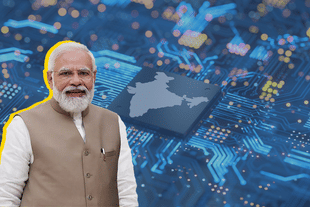Commentary
PM Modi Breaks Ground On Three Semiconductor Projects — Here Is The Lowdown
Amit Mishra
Mar 13, 2024, 04:41 PM | Updated 04:49 PM IST
Save & read from anywhere!
Bookmark stories for easy access on any device or the Swarajya app.


Prime Minister Narendra Modi, today (13 March), laid the foundation stone of maiden fabrication facility at Dholera and two assembly units at Sanand and Morigaon.
This remarkable occasion comes on the heels of the union cabinet's approval of three semiconductor proposals totaling Rs 1,25,600 crore on 29 February and marks a significant step towards creating an indigenous semiconductor ecosystem in the country.
Tata Electronics, in collaboration with Taiwanese foundry Powerchip Semiconductor Manufacturing Corp (PSMC), is spearheading the development of the cutting-edge fab at Dholera in Gujarat.
With a budget of Rs 91,000 crores ($11 billion), construction will begin soon, aiming to produce the first chip by the end of 2026, according to Frank Huang, chairman of PSMC.
A semiconductor fab — short for fabrication — is a manufacturing plant in which raw silicon wafers are turned into integrated circuits (ICs), a fundamental component in virtually all electronic hardware worldwide.
The Dholera fab will have the capacity to produce 50,000 wafers per month, catering to various industries including display drivers, microcontrollers (MCU) and high-performance computing logic among others.
This marks a big leap for India’s domestic chip manufacturing ambition - an area where New Delhi's repeated attempts have often fallen short to get global companies to set up shops in the country.
It is also a strategic vantage point considering that about 70 per cent of the current global manufacturing capacity is concentrated in China, South Korea, Taiwan, the US, and Japan, as reported by the California-based semiconductor advocacy group SEMI.
Additionally, Tata Electronics is also establishing an Outsourced Semiconductor Assembly and Test (OSAT) facility in Jagiroad, Morigaon, Assam with an estimated cost of Rs 27,000 crore.
Semiconductor assembly and test is a critical part of the semiconductor value chain where wafers manufactured by semiconductor fabs are assembled or packaged and then tested before they are finally used in the desired product.
Construction of the facility is set to commence this year, with the initial phase expected to be operational by mid-2025, supplying semiconductor chips to end-users and Original Equipment Manufacturers (OEMs) in India and abroad.
The Jagiroad facility boasts two distinctive advantages: its strategic location and choice of technology partners. Situated strategically with access to ample water and green power, it also benefits from proximity to existing semiconductor packaging and testing hubs in nations such as Taiwan, Malaysia, Vietnam, and Singapore.
However, what really grabs attention are the partnerships formed by the Tatas. They've teamed up with Tesla, the big name in cars, and IBM, the global tech giant, to work together on the OSAT unit, a fact made public in newspaper advertisement.
In Sanand, Gujarat, CG Power is slated to establish another OSAT unit, using technology from Renesas Electronics Corporation of Japan and Stars Microelectronics of Thailand. With an investment of Rs 7500 crores, this facility should start production in the next 2.5 to 3 years.
The groundbreaking ceremony holds three significant implications.
Firstly, the involvement of global conglomerates from Japan, Taiwan, and Thailand signals that New Delhi's ambitious Semiconductor Mission to kick-start domestic chip manufacturing is gaining momentum after a sputtering start in 2021.
In December 2021, the centre launched a Rs 76,000 crore chip incentive scheme, where the centre provides half of a plant’s capital expenditure costs as a subsidy. The proposals approved on 29 February will all receive 50 per cent of their capital expenditure costs from the centre.
Secondly, the timing of this development is noteworthy. India stands to capitalise on a growing trend among global conglomerates to diversify their manufacturing bases away from China amid escalating geopolitical risks such as US-China tensions or a Taiwan crisis.
Furthermore, India's entry into semiconductor manufacturing promises to mitigate risks in global supply chains.
Lastly, it may well attract further investment in the electronics value chain within India, potentially transforming the nation into a significant destination for mature technology.
The government is already evaluating a proposal from Israel’s Tower Semiconductor to establish an $11 billion fabrication plant in the country.




